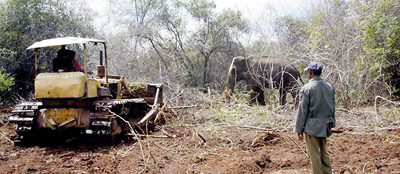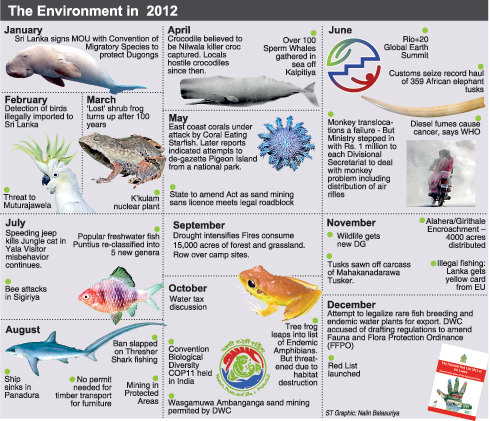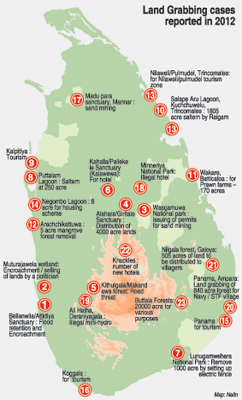News
2012 has been a year of disasters for the country’s fragile environment
View(s):By Malaka Rodrigo
This year has been declared one of the worst ever for the country’s environment. Experts say 2012 was especially disastrous, with environmental crime at an all-time high; pollution, depredation of forest cover, land grabbing, encroachment, deterioration of law and order, and human-animal conflict peaked this year.
Environment lawyer Jagath Gunawardane was whistle-blowing throughout the year, highlighting environment issues. He told the Sunday Times that 2012 has been a disaster for conservation efforts.
Things became especially bad, he said, with environment-protection laws being openly flouted and law amendments that have facilitated the further exploitation and plundering of natural resources.

Human-elephant conflict continues: At least 236 elephants and 62 people killed this year.
In May, the State permitted sand transportation without permits, violating the Mines and Minerals Act. The Supreme Court has since declared this a violation of the Mines and Minerals Act. It is understood that the State had instructed the Geological Survey and Mines Bureau (GSMB) to amend the act to allow sand transport without a licence.
The Flora and Fauna Protection Ordinance (FFPO) was frequently violated during the year. Attempts to amend the ordinance to facilitate the exploitation of threatened species were reported. Infrastructure and development projects were allowed to go ahead, even though no proper Environmental Impact Assessments (EIA) had been made.
On a positive note, at least two mini-hydro projects were put on hold after environmentalists protested.
Numerous cases of poaching, smuggling and illegal animal possession were reported, including the seizure of the largest haul of elephant tusks ever by Sri Lanka Customs.
Political interference is making it increasingly hard to control environment crime. A business in exotic birds was halted, although the birds were later returned to the owner. Wildlife officers were attacked and manhandled when attempting to arrest poachers in the course of duty.

For 11 months, the Department of Wildlife Conservation (DWC) had been operating without a permanent Director General. As acting DG, the Secretary to the Ministry of Wildlife and Agrarian Services was criticised by environmentalists who were outraged by some of his directives. A permanent Director General was appointed in November.
Yala was in the spotlight many times during the year. Private campsites inside the park became a hot issue, and controversy erupted over Jeep Drivers attacking employees of campsite operators. The setting up of private campsites inside a national park was later deemed a violation of the Fauna and Flora Protection Ordinance (Sri Lanka).
The campsites were dismantled in October on an order from President Mahinda Rajapaksa. Meanwhile, misbehaved visitors and unruly safari Jeep drivers continue to tarnish the country’s image as a wildlife destination.
The human-elephant conflict continues. Up to November this year, 236 elephant and 62 people were killed in the conflict. Elephant translocation was temporally stopped after a Galgamuwa tusker died while being transported.
The crocodile-human conflict has intensified, especially after a crocodile killed a young person in the Nilwala River. Cases of poisoning and killing of crocodiles have been reported. The State has approved the translocation of Toque Monkeys (Rilawa), while wildlife experts declare the exercise a failure.
Sri Lanka’s heavy dependence on agro-chemicals in cultivation has been a much discussed issue.
Hemantha Withanage of Environmental Justice said 2012 was a year of natural disasters.
“We are being hit by extreme weather events,” he told the newspaper. “Earlier this year, we experienced severe hardship because of the drought. Now we are suffering under floods. This is a clear sign that extreme weather resulting from climate change has begun to hit us.”
Land grabbing and encroachment

The year has seen several instances of land grabbing, which is largely the result of ill-conceived development projects, says Sajeewa Chamikara of Environment Conservation Trust (ECT).
Tourism and agricultural projects top the list of land-grab “offences”, while politicians continue to distribute lands for settlement. More than 2,565 hectares of land have been acquired for tourism projects in Trincomalee, Batticaloa, Puttalam, Badulla and Galle. Some are located in environment-sensitive areas, such as mangrove forests.
Mr. Chamikara said that 17,273 hectares were “grabbed” for six large-scale agriculture projects.
In Amarawewa, in Yala, nearly 1,500 hectares have been “grabbed” for a gliricidia project.
Mr. Chamikara said the victims are indiscriminate land grabbing were the environment and the people.
Follow @timesonlinelk
comments powered by Disqus




















